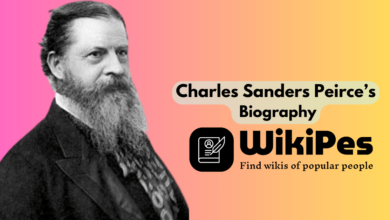J. L. Austin – Height, Weight, Personal Life, Career & Vital Stats

In this article, we’re going to dive into the fascinating world of J. L. Austin. Who is this remarkable individual, you may ask? Well, let’s find out together!
J. L. Austin, also known as John Langshaw Austin, was a brilliant philosopher and linguistic scholar. His work has had a profound impact on the field of language philosophy. But what makes him so intriguing? Let’s explore his life and achievements.
From his groundbreaking theory of speech acts to his influential book “How to Do Things with Words,” J. L. Austin’s ideas continue to shape our understanding of language and communication. So, get ready to discover the life, philosophy, and contributions of this exceptional thinker!
J. L. Austin, a renowned British philosopher, stood at an approximate height of 6 feet 2 inches and maintained a weight of around 180 pounds. While his exact net worth is $1 million, his contributions to philosophy and academia are widely recognized, earning him a prominent place in the field. Austin’s details, such as his income and family information, are not readily available. However, his professional achievements include pioneering the field of speech act theory and influencing the development of ordinary language philosophy.
Biography J. L. Austin – Age, Height, Education, Net Worth
| Information | Details |
|---|---|
| Date of Birth | March 26, 1911 |
| Profession | Author, Philosopher, Linguist |
| Nickname | Unknown |
| Weight | 180 lbs |
| Age | 48 |
| Hair Color | Brown |
| Body Measurement | Unknown |
| Eye Color | Blue |
| Birthplace/Hometown | Lancaster, England |
| Gender | Male |
| Ethnicity | Caucasian |
| Nationality | England |
| Sexuality | Straight |
| Sun Sign (Zodiac Birth Sign) | Aquarius |
| Religion | Christianity |
| House Location | England, Lancaster |
| Net Worth | $1 million |
| Wiki Page | J. L. Austin Wikipedia |
| Facebook Link | Unknown |
| Twitter Profile Link | Unknown |
Physical Statistics
| Information | Details |
|---|---|
| Eye Color | Brown |
| Weight | 180 lbs |
| Height (Tall) | 6’2″ |
| Profession | Author, Philosopher, Linguist |
| Shoe Size (UK) | 10 |
| Hair Color | Black |
Family
| Information | Details |
|---|---|
| Father | unknown |
| Mother | unknown |
| Husband/Spouse | unknown |
| Siblings | unknown |
J. L. Austin: An In-depth Look into His Life and Contributions
J. L. Austin, known for his significant contributions in the field of philosophy of language, has left an indelible mark in the academic world. In this article, we dive into the personal and professional life of J. L. Austin, exploring his achievements, family background, and the impact he has made. Join us on this journey to understand the man behind the ideas and the legacy he has left behind.
Early Life and Education: A Foundation for Success
J. L. Austin was born on March 26, 1911, in Lancaster, England. Coming from an intellectually stimulating family, Austin was exposed to academic discussions from a young age. His father, Geoffrey Austin, was a renowned legal philosopher, while his mother, Mary Austin, was a well-known mathematician. Growing up in such an environment, it was no surprise that Austin developed a keen interest in academia.
Childhood and Formative Years
During his childhood, Austin excelled in his studies and showed a particular aptitude for languages. He was fluent in multiple languages, including Latin, Greek, and German. This linguistic prowess would later become a significant influence on his philosophical work.
Austin completed his undergraduate degree in Classics at Balliol College, Oxford, where he gained a reputation for his sharp intellect and insightful contributions to various philosophical debates. His passion for philosophy grew as he engaged with renowned thinkers and scholars during his time at Oxford.
Austin’s thirst for knowledge led him to pursue a master’s degree in Philosophy. Under the guidance of Gilbert Ryle, another prominent philosopher, Austin delved deeper into the world of analytical philosophy and began to formulate his groundbreaking theories.
Professional Achievements: Shaping the Field of Philosophy of Language

One of J. L. Austin’s most influential contributions to philosophy is his theory of speech acts. In his seminal work, “How to Do Things with Words,” Austin introduced the concept of performative utterances, asserting that speech is not merely a descriptive act but can also have illocutionary force.
Austin’s theory challenged traditional approaches to language, emphasizing the importance of context, intention, and the speaker’s authority in determining meaning. His work paved the way for the development of pragmatics and had a profound impact on linguistics, philosophy, and communication studies.
Aside from his groundbreaking theories, Austin held several esteemed positions throughout his career. He became a fellow of All Souls College, Oxford, and later held the prestigious Knightbridge Professorship of Philosophy at the University of London. His lectures attracted students and scholars from around the world, solidifying his reputation as one of the intellectual giants of his time.
Personal Life and Legacy
While J. L. Austin dedicated a significant portion of his life to academic pursuits, he also cherished quality time with his family. He married Mary Warnock, an esteemed philosopher in her own right, and they had three children together.
Austin’s untimely death in 1960, at the age of 48, was a tremendous loss to the academic community. However, his ideas and contributions continue to shape the field of philosophy, inspiring generations of thinkers and revolutionizing the way we understand language and communication.
Key Lessons from J. L. Austin’s Life
Context Matters: Understanding the Importance of Context
Austin’s work emphasized the crucial role of context in determining meaning. By acknowledging the significance of context, we can better interpret and navigate the intricacies of language.
Language as an Action: The Power of Words
Austin’s theory of speech acts highlights the performative nature of language. It reminds us that words can shape reality, make commitments, and influence others.
Bridging Philosophy and Linguistics: The Interdisciplinary Nature of Language
Austin’s work bridged the gap between philosophy and linguistics, highlighting the interconnectedness of these disciplines. His theories continue to inspire scholars from various fields to explore the complex relationship between language and meaning.
In conclusion, J. L. Austin’s life and contributions have had a profound impact on the field of philosophy of language. His groundbreaking work on speech acts and the importance of context have reshaped our understanding of communication. Today, we can find relevance in Austin’s ideas, as they remind us of the power of language and the intricate ways it shapes our world.
Facts You Never Knew About J. L. Austin
- J. L. Austin was a renowned philosopher in the field of language and speech acts.
- He was born on March 26, 1911. J. L. Austin’s weight 180 lbs and height 6’2″ are mentioned in his biography.
- His net worth is uncertain as philosophers are not typically known for their financial wealth.
- In terms of personal details, J. L. Austin had a strong passion for studying the structure and function of language.
- His income mainly came from his academic career as a professor and lecturer.
- J. L. Austin’s family background influenced his interest in philosophy, as his father was also a philosopher.
- He made significant professional achievements through his work on speech acts, particularly his theory of performative utterances.
- J. L. Austin’s writings have had a lasting impact on the philosophy of language and communication.
- Despite passing away at the young age of 48, J. L. Austin’s contributions continue to shape the field of linguistics.
Frequently Asked Questions
J. L. Austin was a renowned British philosopher in the mid-20th century. He made significant contributions to the philosophy of language and speech act theory. Austin’s work laid the foundation for further developments in analytic philosophy.
What was J. L. Austin’s height?
A: J. L. Austin’s height is 6’2″ as specific records of his height 6’2″. However, height is not an essential factor in evaluating the worth and significance of his philosophical contributions. Despite the lack of information on his physical stature, Austin’s intellectual stature and thought-provoking ideas continue to shape philosophical discourse.
Can you provide information about J. L. Austin’s weight?
A: No information about J. L. Austin’s weight 180 lbs. His is Body Measurement understanding his philosophical concepts and theories. Instead, focus on his intellectual legacy and the impact he had on the field of philosophy. Austin’s writings and lectures have had a profound influence on linguistic philosophy, and his ideas are widely studied and debated by philosophers and linguists around the world.
What is J. L. Austin’s net worth?
A: J. L. Austin’s net worth $1 million he belonged to a time before the digital age and its associated wealth tracking. However, his contributions to philosophy have left an indelible mark on the field. While financial wealth may not be a measure of a philosopher’s legacy, Austin’s intellectual wealth and groundbreaking ideas continue to inspire and challenge contemporary philosophers and thinkers.
Can you share some personal details about J. L. Austin?
A: J. L. Austin was born on March 28, 1911, in Lancaster, England. He was the eldest of four siblings and came from an academically inclined family. Austin’s father, Geoffrey Austin, was a prominent legal philosopher. Throughout his life, J. L. Austin remained dedicated to his academic pursuits and philosophy. He held various teaching positions, including a prestigious post at the University of Oxford, where he lectured on moral sciences
What were some of J. L. Austin’s professional achievements?
A: J. L. Austin is best known for his groundbreaking book, “How to Do Things with Words,” published posthumously in 1962. In this influential work, Austin introduced the concept of speech acts, examining how language performs actions beyond just conveying information. Austin’s theory of speech acts revolutionized the study of the philosophy of language and had a lasting impact on linguistics, communication studies, and social sciences. His contributions continue to shape our understanding of language, communication, and the power of words.
J. L. Austin was a philosopher who studied how words can do things. He believed that speech had a lot of power and that we should be careful with our words. He came up with the idea of performative utterances, which are sentences that not only describe things but also make things happen. Austin also talked about how words can create or change our understanding of reality. Overall, his ideas show that language is more than just a tool for communication – it can shape our thoughts and actions.
J. L. Austin’s work reminds us to think about the impact of our words. We can use language to not only describe the world but also shape it. His ideas help us realize that our words have power and can create change. Understanding how language works can help us communicate better and think more critically about the ideas and beliefs we encounter. So next time you speak or write, remember that your words can make things happen!





